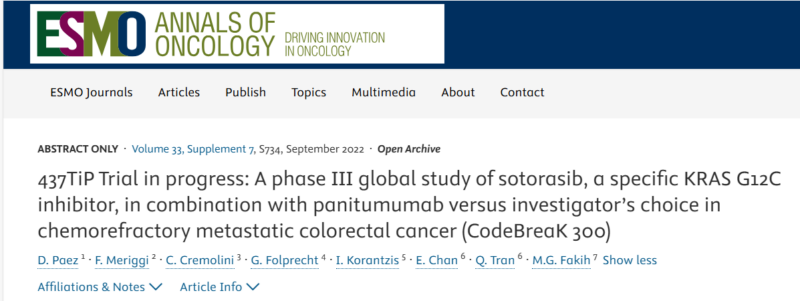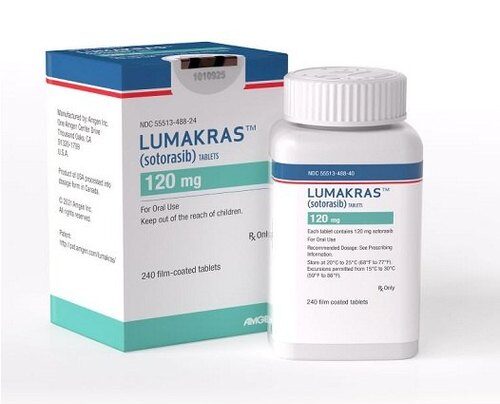On January 16, 2025, the Food and Drug Administration approved sotorasib in combination with panitumumab for adult patients with KRAS G12C-mutated metastatic colorectal cancer (mCRC).
As determined by an FDA-approved test, who had received prior fluoropyrimidine-, oxaliplatin-, and irinotecan-based chemotherapy.
On the same day, the FDA also approved the therascreen KRAS RGQ PCR Kit (QIAGEN GmbH) as a companion diagnostic device to help identify patients with colorectal cancer whose tumors harbor KRAS G12C mutations and who may have been eligible for Lumakras with Vectibix.
Efficacy and Safety
Efficacy was evaluated in CodeBreaK 300 a randomized, open-label, controlled trial involving patients with KRAS G12C-mutated metastatic colorectal cancer (mCRC) who had previously received chemotherapy based on fluoropyrimidine, oxaliplatin, and irinotecan. The KRAS G12C mutations were identified in tumor tissue samples using the QIAGEN therascreen KRAS RGQ PCR kit. A total of 160 patients were randomized into three groups: one received sotorasib 960 mg orally once daily with panitumumab 6 mg/kg IV every 2 weeks, another received sotorasib 240 mg orally once daily with panitumumab 6 mg/kg IV every 2 weeks, and the third group received investigator’s choice of standard of care (SOC) treatments, such as trifluridine/tipiracil or regorafenib.
The primary efficacy endpoint was progression-free survival (PFS) evaluated by blinded independent central review according to RECIST v1.1. Additional efficacy measures included overall survival (OS), overall response rate (ORR), and duration of response (DOR). The study found that the median PFS was 5.6 months for the sotorasib 960 mg/panitumumab group, significantly longer than the 2 months observed in the SOC arm (hazard ratio 0.48, p-value 0.005). ORR was 26% in the sotorasib 960 mg/panitumumab arm, compared to 0% in the SOC arm. However, the final analysis of OS was not statistically significant. Median DOR in the sotorasib 960 mg/panitumumab group was 4.4 months.
The sotorasib 240 mg/panitumumab group did not show a statistically significant improvement in PFS compared to the SOC arm. Common adverse reactions (≥20%) in the sotorasib 960 mg/panitumumab group included rash, dry skin, diarrhea, stomatitis, fatigue, and musculoskeletal pain. Grade 3-4 laboratory abnormalities in ≥2 patients were decreased magnesium, potassium, corrected calcium, and increased potassium. The recommended dose of sotorasib was 960 mg orally once daily, with panitumumab administered as an IV infusion every 14 days until disease progression or unacceptable toxicity. The review of this application was conducted using the FDA’s Real-Time Oncology Review (RTOR) pilot program, facilitating a streamlined data submission process.

About CodeBreaK 300 trial
CodeBreaK 300 is a global phase III randomized, open-label, active-controlled trial evaluating the efficacy and safety of oral sotorasib combined with intravenous panitumumab in patients with metastatic colorectal cancer (mCRC) who have a KRAS G12C mutation. The study titled “437TiP Trial in progress: A phase III global study of sotorasib, a specific KRAS G12C inhibitor, in combination with panitumumab versus investigator’s choice in chemorefractory metastatic colorectal cancer (CodeBreaK 300)” published on ESMO Annals of Oncology includes key eligibility criteria such as confirmed KRAS G12C mutation via central molecular testing of tumor biopsy and at least one prior line of therapy.
Authors: D. Paez, F. Meriggi, C. Cremolini, G. Folprecht, I. Korantzis, E. Chan, Q. Tran, M.G. Fakih

Patients must have progressed or experienced disease recurrence on or after treatment with fluoropyrimidine, irinotecan, and oxaliplatin unless deemed ineligible by the investigator. Approximately 153 patients will be randomized into three groups to receive either sotorasib 960 mg daily with panitumumab, sotorasib 240 mg daily with panitumumab, or investigator’s choice of standard-of-care treatments like trifluridine/tipiracil or regorafenib.
The primary endpoint of the study is progression-free survival (PFS) based on the Response Evaluation Criteria in Solid Tumors (RECIST v1.1), evaluated by Blinded Independent Central Review (BICR). Secondary endpoints include overall survival (OS) and objective response rate (ORR). Global enrollment is ongoing, and the trial aims to determine whether the combination of sotorasib and panitumumab provides a significant clinical benefit in mCRC patients with the KRAS G12C mutation, particularly those who have already undergone prior therapies. The study is designed to assess the potential of this combination therapy to improve patient outcomes in this challenging cancer population.
About Sotorasib
Sotorasib is a targeted anti-cancer drug designed to specifically inhibit the KRAS G12C mutation, a genetic alteration found in various cancers, particularly in non-small-cell lung cancer (NSCLC). KRAS, a gene encoding a protein involved in cell signaling, becomes oncogenic when mutated, leading to uncontrolled cell growth. Sotorasib works by binding irreversibly to the mutated KRAS G12C protein, preventing it from remaining in an active state that drives tumor growth. By targeting the mutation, sotorasib offers a more precise treatment for patients with KRAS G12C-mutated cancers, distinguishing it as a first-in-class drug in cancer therapy.
The drug has been clinically tested, showing efficacy in patients with KRAS G12C-mutated NSCLC, particularly those who have not responded to previous lines of therapy. It has demonstrated improvements in progression-free survival and overall response rate in clinical trials, offering a new treatment option for patients with a previously difficult-to-target mutation. Sotorasib is taken orally, and it has been approved by regulatory agencies such as the U.S. Food and Drug Administration (FDA) in May 2021 and the European Medicines Agency (EMA) in January 2022 for patients with advanced or metastatic NSCLC. Its approval marked a significant step forward in the treatment of cancers driven by KRAS mutations.

Sotorasib’s side effects can include common issues like diarrhea, fatigue, musculoskeletal pain, nausea, liver enzyme abnormalities, and cough, which can vary in severity among patients. Despite these side effects, the drug’s targeted action and ability to address a significant portion of NSCLC cases make it a valuable therapeutic option. The ongoing clinical development of sotorasib aims to expand its application to other cancers with KRAS G12C mutations, including colorectal cancer, where it shows promise. Its development is closely followed due to its potential to revolutionize the treatment landscape for cancers traditionally considered resistant to targeted therapies.
About Panitumumab
Panitumumab, marketed under the brand name Vectibix, is a fully human monoclonal antibody designed to target the epidermal growth factor receptor (EGFR). EGFR is a protein involved in cell signaling, growth, and division, and is often overexpressed in various types of cancer, including metastatic colorectal cancer. By binding to EGFR, panitumumab blocks the receptor’s activation, which in turn inhibits the downstream signaling pathways that promote cancer cell growth and survival. This mechanism of action makes panitumumab a targeted therapy, particularly for cancers that express EGFR.
Panitumumab was first approved by the U.S. Food and Drug Administration (FDA) in September 2006 for the treatment of EGFR-expressing metastatic colorectal cancer (mCRC) that has progressed despite prior treatments. It is indicated specifically for patients with non-mutated (wild-type) KRAS, as KRAS mutations are known to prevent the drug from being effective. The European Medicines Agency (EMEA) approved it in 2007, and Health Canada followed with approval in 2008. Panitumumab also played a pioneering role in demonstrating that KRAS mutations could be used as a predictive biomarker for response to treatment in colorectal cancer.

While panitumumab can be effective, it is associated with various side effects, most notably dermatological toxicities like skin rashes, which can affect sun-exposed areas like the face and chest. Severe skin reactions may require interventions such as oral antibiotics or topical steroid creams. Additionally, ocular toxicity, such as keratitis, was observed in a significant portion of patients, which sometimes required discontinuation of the therapy. Panitumumab also carries a boxed warning for skin toxicities and has been linked to pulmonary fibrosis and interstitial lung disease in clinical trials. Despite these adverse effects, skin toxicities have been associated with better progression-free survival and overall survival, making management of these side effects an important consideration in patient care.


